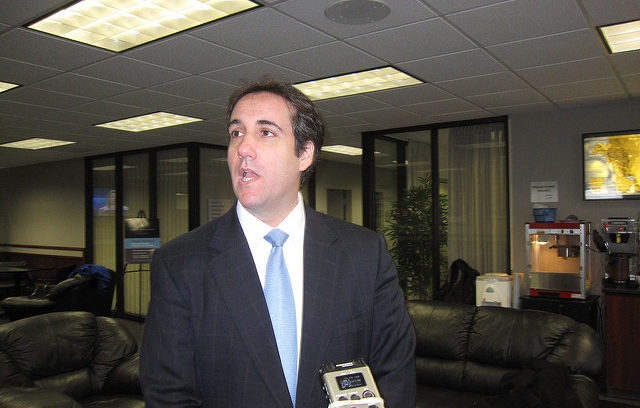President Donald Trump’s former attorney Michael Cohen pleaded guilty Thursday to lying to Congress about his work on a Trump business project in Russia, an admission that corroborated parts of the infamous dossier that detailed a conspiracy between the Kremlin and Trump’s campaign.
In the plea agreement with Special Counsel Robert S. Mueller III, Cohen admitted to being in contact with the Russian government deep into the 2016 presidential campaign while working on a Trump-branded property in Moscow.
Cohen acknowledged that he was in touch that summer with Dmitry Peskov, the spokesman for Russian President Vladimir Putin who also took the lead in the Kremlin’s pro-Trump operation, according to a dossier compiled by the former British spy Christopher Steele.
Steele’s dossier set off a political firestorm when it was first published by BuzzFeed News in January 2017, outlining the conspiracy and making salacious — and unproven — accusations about a liaison between Trump and prostitutes at the Moscow Ritz-Carlton years earlier.
The dossier reported that Peskov was the “main protagonist” in Moscow’s efforts to elect Trump, including the hacking of the Democratic National Committee’s emails, while Cohen was playing a “key role” in the “secret TRUMP campaign/Kremlin relationship.”
Cohen admitted Thursday that Peskov invited him to be his guest at the St. Petersburg Forum in mid-June 2016, when he would potentially meet with Putin or Russian Prime Minister Dmitry Medvedev.
Peskov “wants to meet there with you and possibly introduce you to either [the President of Russia] or [the Prime Minister of Russia], as they are not sure if 1 or both will be there,” a third party wrote to Cohen in May. “He said anything you want to discuss including dates and subjects are on the table to discuss.”
Later Thursday, BuzzFeed News, citing law-enforcement sources, reported that Cohen had discussed giving Putin a $50 million penthouse in the proposed Trump building with an assistant to Peskov.
Cohen also discussed traveling to Moscow to meet with Russian officials “before Cleveland,” a reference to the Republican National Convention that July, and suggested that Trump could travel there “once he comes the nominee after the convention.”
Days before Cohen was to leave for Russia in June, he called off the trip for unspecified reasons, according to a criminal information filed Thursday by Mueller.
Steele’s dossier noted that Cohen’s planned trip to Moscow that summer was “shifted” to a neutral location — Prague — in August “when it was judged too compromising for him to travel to the Russian capital.”
Cohen has denied traveling to Prague for the meeting, but McClatchy reported in April that Mueller had found evidence he indeed made the trip in late-summer 2016. That trip was not referenced in the criminal information Mueller filed Thursday.
Former Director of National Intelligence James Clapper told Salon in May that parts of Steele’s dossier continued to be proven true.
“Some of what was in the dossier was actually corroborated — but separately — in our intelligence community assessment, from other sources that we were confident in,” Clapper said. “The salacious parts, no. That’s never been corroborated. It would appear to me that as time has gone on more and more of it has been corroborated, but I can’t actually give you a percentage.”
In 2017, Clapper and other members of the intelligence community issued a report outlining Russia’s efforts to support Trump’s campaign against former Secretary of State Hillary Clinton.
“We assess Russian President Vladimir Putin ordered an influence campaign in 2016 aimed at the US presidential election. Russia’s goals were to undermine public faith in the US democratic process, denigrate Secretary Clinton, and harm her electability and potential presidency. We further assess Putin and the Russian Government developed a clear preference for President-elect Trump,” the report concluded, backing up assertions Steele had written in memos months earlier.
Cohen could face up to five years in prison by pleading guilty to misleading the House and Senate intelligence committees, whom he told he had shut down Trump’s Moscow project by January 2016, “before the Iowa caucus and months before the very first primary.”
Cohen was already facing prison time after pleading guilty in August to eight criminal counts, including violating campaign-finance laws by coordinating payments to keep the stories of two women who had sexual encounters with Trump from coming out during the closing months of the campaign.
He also pleaded guilty to evading personal income taxes.

